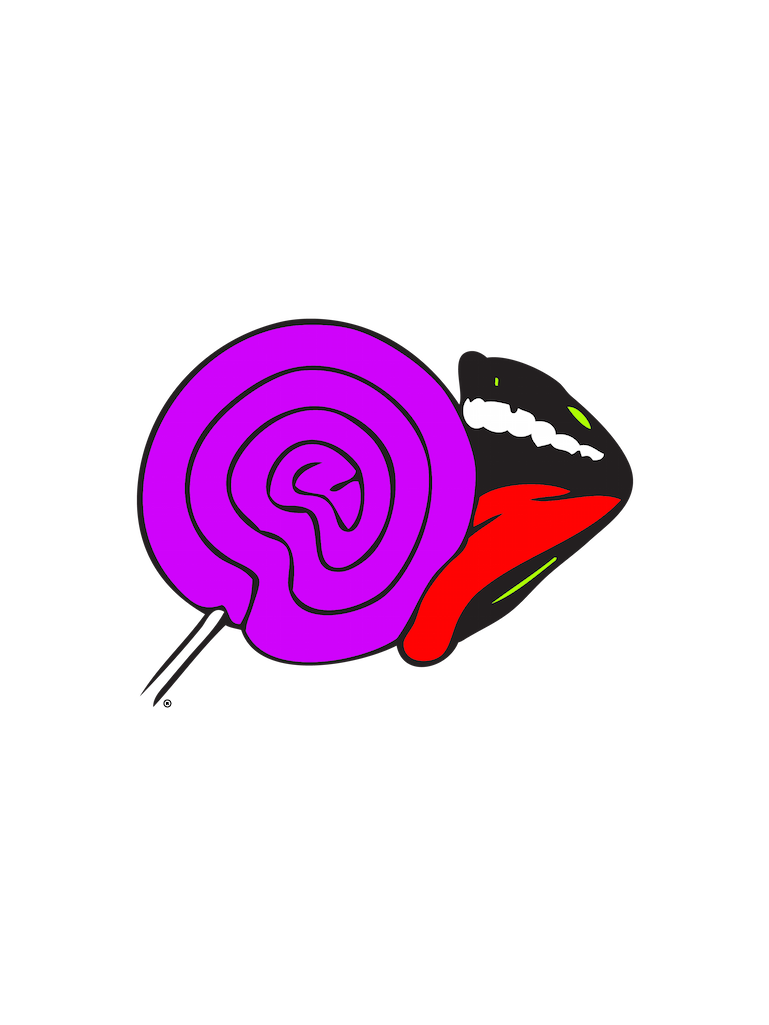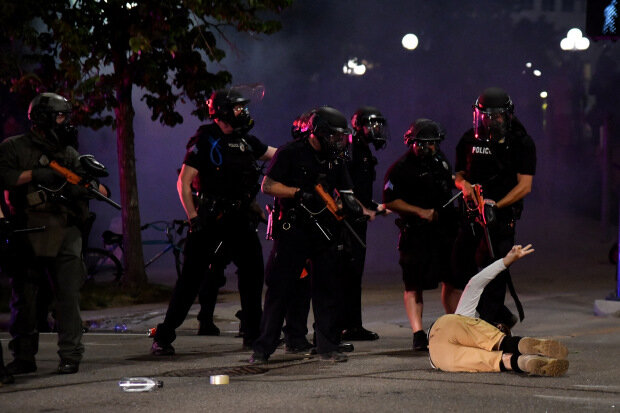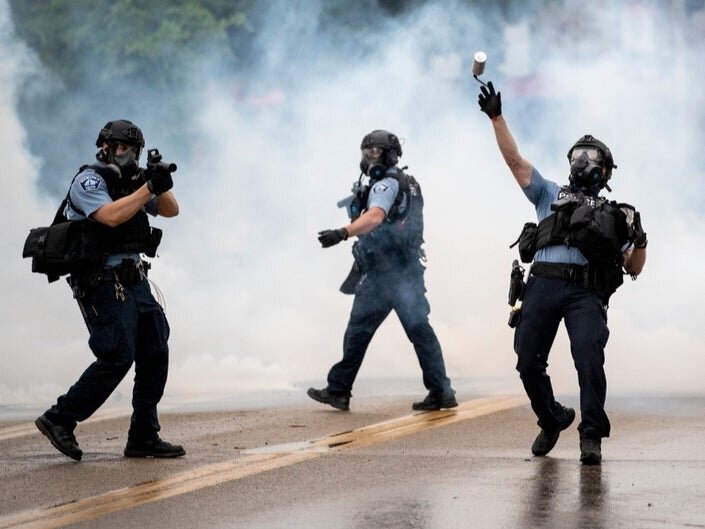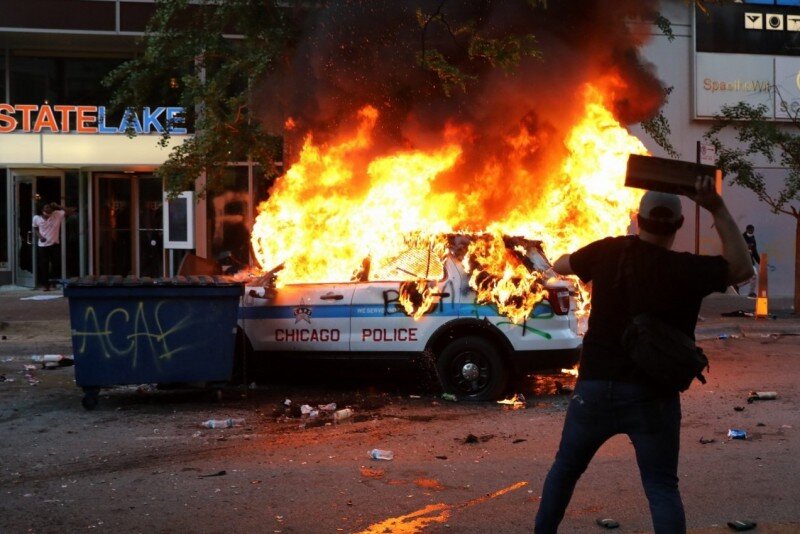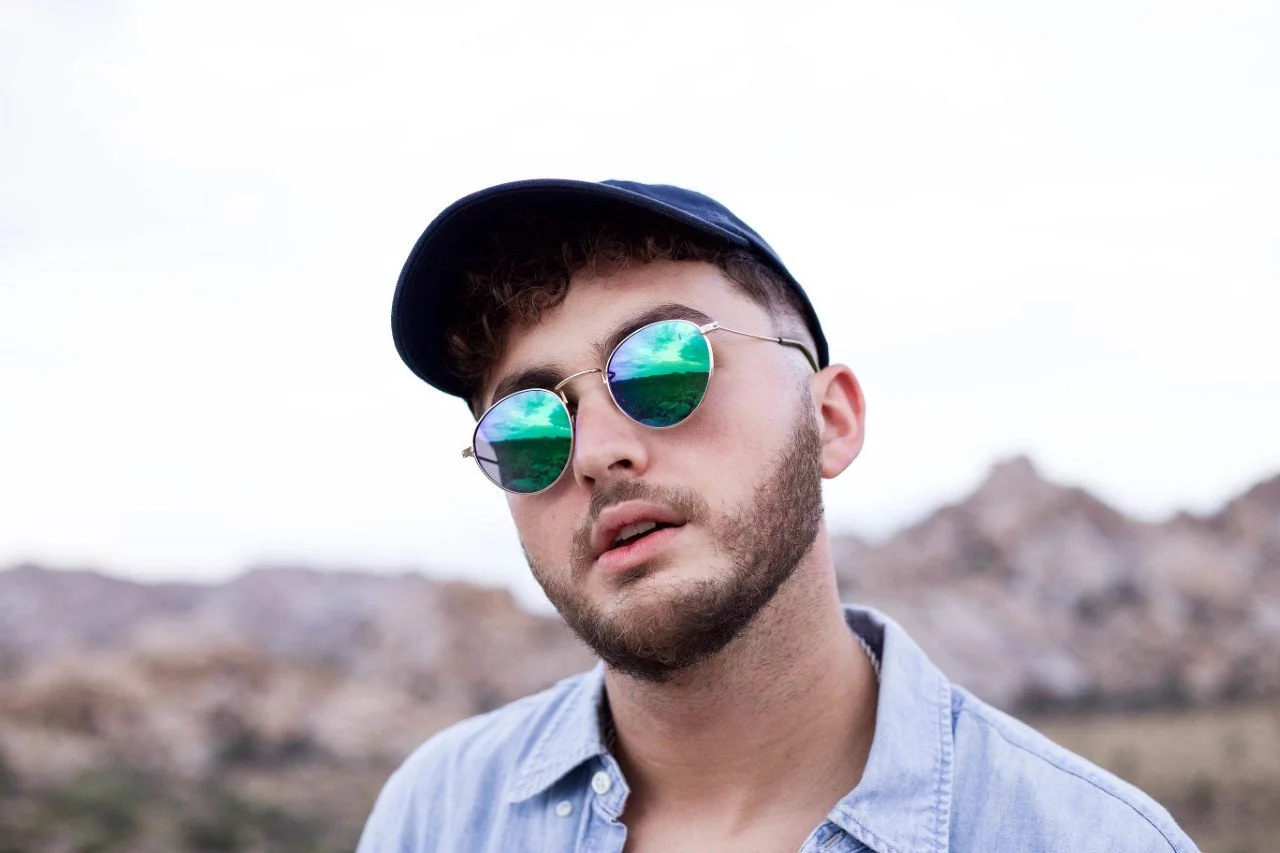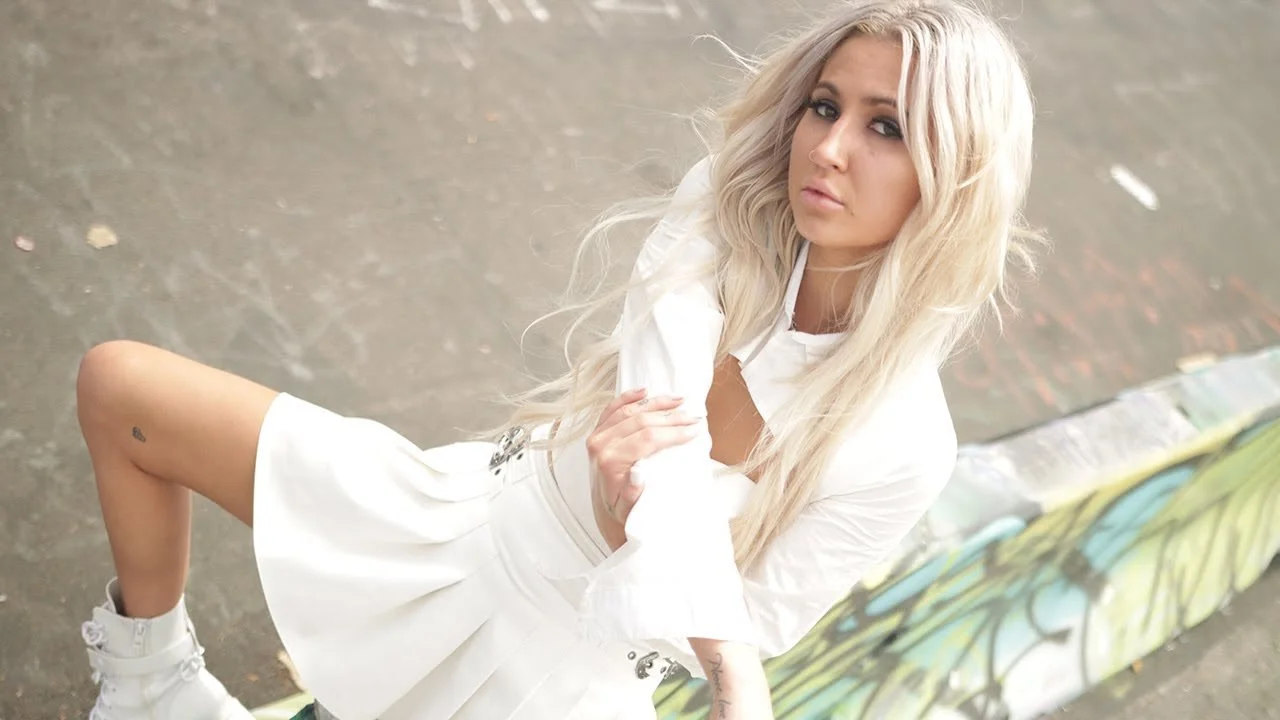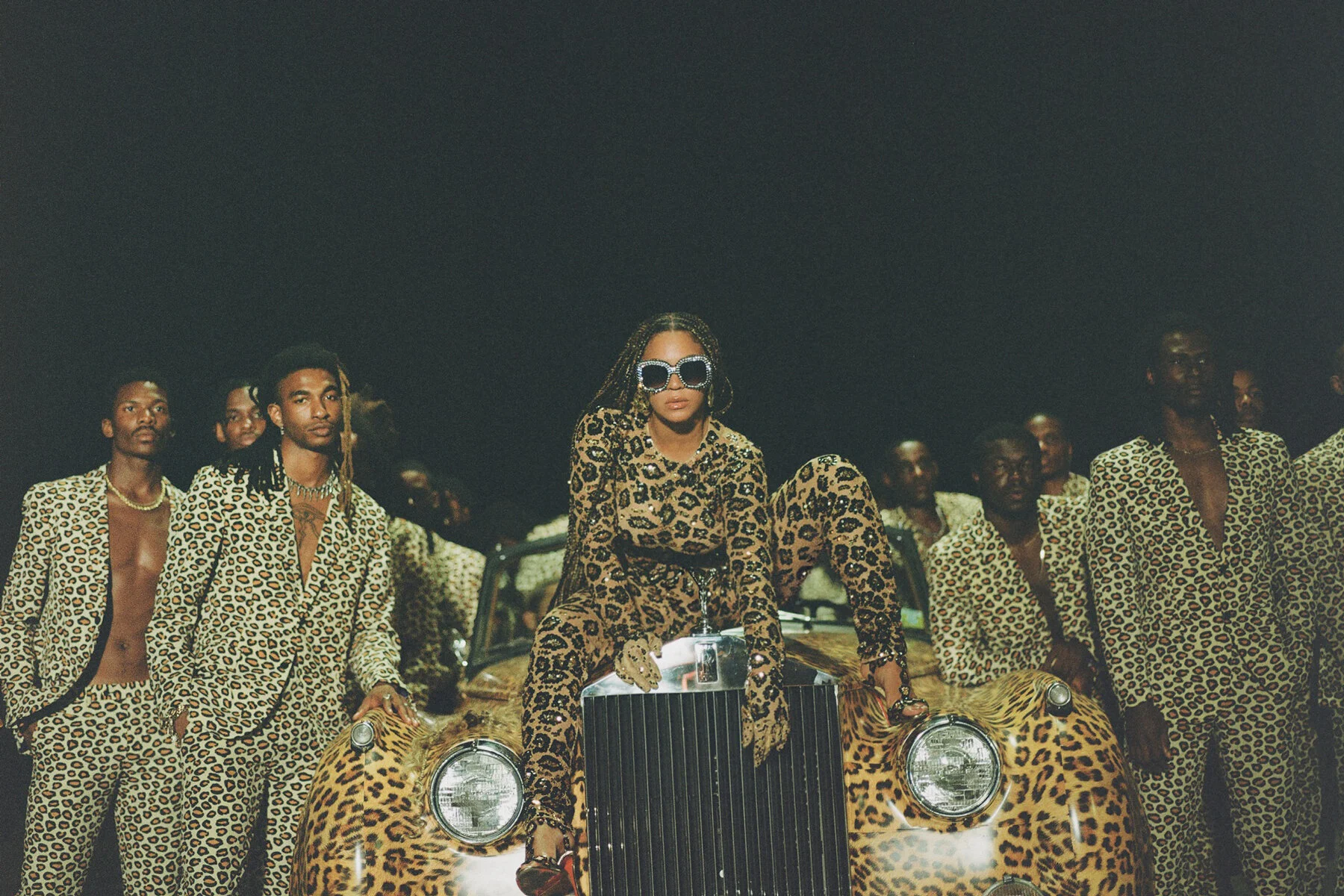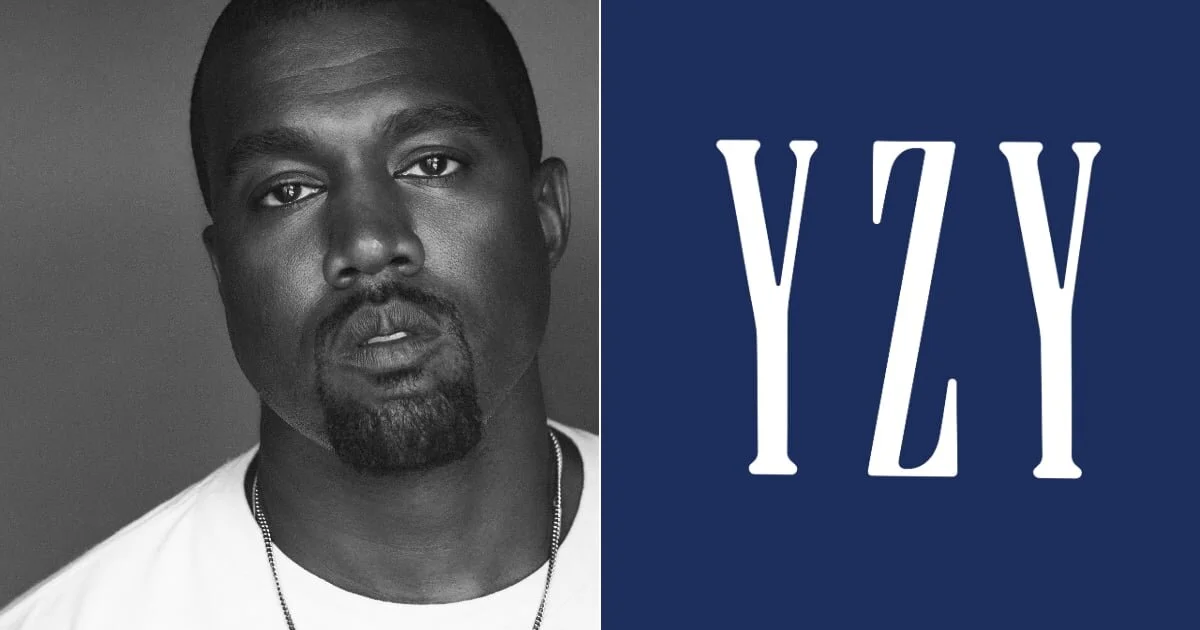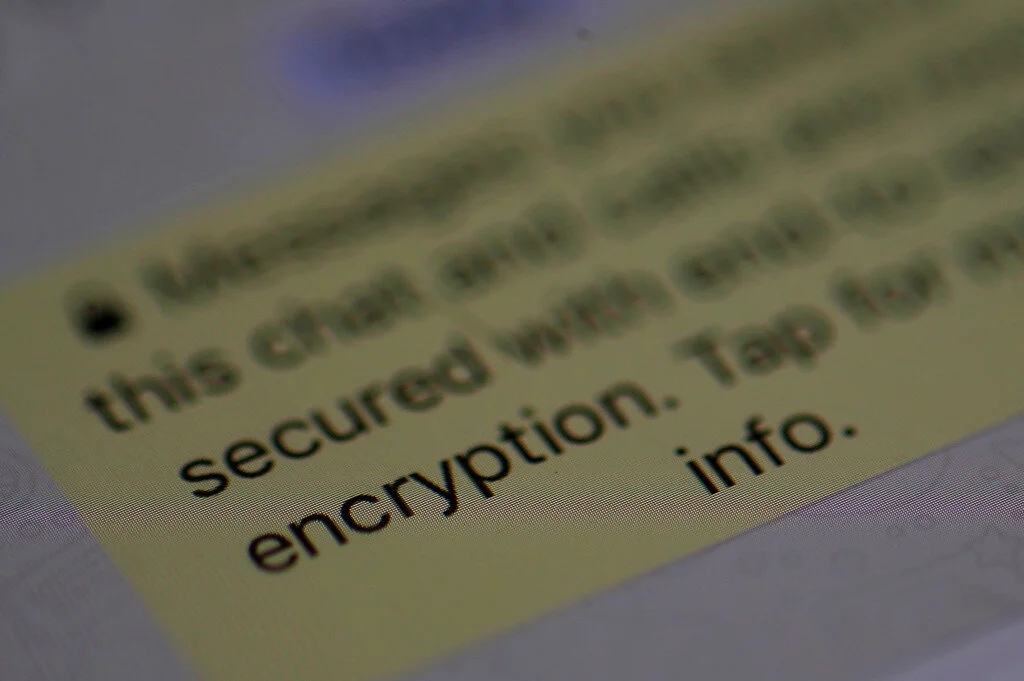How does the protests and curfew affect you?
Scenes of mayhem and rage are transfixing America today. George Floyd, a 46-year-old African- American man, died in Minneapolis on May 25th, while being ruthlessly restrained by a Police Officer. Video footage of the incident showed the Officer kneeling on Floyd’s neck for over 5 minutes, till he was unconscious. The officer didn’t move his knee for 3 more minutes after that- while Floyd gasped for breath. This video went viral and sent a tremor of outrage across the whole country.
This mishap once again brought to the fore concerns over the law enforcement’s bias against the African American minority, and the constant reoccurrence of unnecessary Police brutality.
A demonstrator holds up a sign in front of local law enforcement in Los Angeles. (May 30th 2020)
The public, rightfully angered, quickly took to the streets to demonstrate their loss of faith in the American justice system. The largest gatherings have been in the Twin Cities, where peaceful protests quickly turned into riots in places, following constant clashes with the police. Other demonstrations organized in cities across the country have drawn thousands of voices out- calling for police reform while mourning the death of yet another unarmed black person in the U.S.
“I can’t breathe”, the final words of George Floyd, have become a rallying cry among protesters across the globe.
LATimes: Peaceful demonstrations in DTLA.
In many cities, demonstrators clashed with officers dressed in heavy-duty riot gear, and peaceful protests quickly turned violent- in some places. Videos showed police officers firing teargas, flash bombs and rubber bullets to disperse crowds, while protesters threw rocks and bottles at police cars.
Highways were blocked, windows were broken, and the White House was placed under a temporary lockdown. The unrest led to looting, shootings, and vandalism in some cities. Many were injured and at least six people were killed in violence related to the riots.
Among several other incidents across the country, six people were shot, and one was killed Saturday night, in Chicago.
Since the first gathering in Minneapolis, protests have flared up in about 140 cities across the United States, and the National Guard has been deployed in at least 21 states. The civil unrest demands empathy from the authorities, but it is met with constant attempts of “domination.” People want to be heard by authorities that do not want to listen.
In response to the demonstrations, President Trump gave an “ultimatum” to the protesters and suggested that the military could use armed force to suppress riots. He called the demonstrators “THUGS” in a tweet where he wrote, “When the looting starts, the shooting starts…”
The clashes didn’t stop and nor did the looting, and soon dozens of officials, in cities coast to coast, implemented curfews in hopes that they would prevent another night of violent outbreaks. The police began charging crowds and arresting vandals, and looters. In New York, a woman was arrested for hurling a molotov cocktail at a police car. Fortunately, all the passengers got out, and the Molotov didn’t ignite.
In some places, the citywide orders were not enough to maintain peace between the protesters and the police. In Philadelphia, demonstrators marched up to the City Hall, past their 6 p.m. curfew. After the 9 p.m. curfew in Chicago, people gathered near the Uptown area, to continue their peaceful demonstrations. In Louisville, a man was shot when police officers and the Kentucky National Guard “returned fire” while clearing a large crowd early Monday. In response, protesters stood with their hands up, in front of dozens of geared up officers, well after the 9.30 p.m. curfew. Videos and photos showed the authorities using brute force to disperse the crowds in most of these places.
In Buffalo, while the police attempted to push back a handful of protesters with tactical gear, an SUV rammed through and brutally mowed down some of the officers. The woman responsible is now facing felony charges.
Police continued to arrest people who were looting stores or were on the streets in violation of a city curfew.
On June 2nd, LA County announced another night of curfew in the region, starting at 6.00 p.m. According to L.A. County, these curfews have been set because of “dangers which often occur under cover of darkness and the difficulty to preserve public safety during these hours.” Numerous other mayors have decided to extend their citywide curfews.
Residents are advised to remain in their homes and stay off the streets. Many counties across the country listed the following exemptions: “Peace officers, firefighters, and National Guard or other military personnel deployed to the area, individuals traveling to and from work, people experiencing homelessness and without access to a viable shelter and individuals seeking medical treatment.”
Even with regulations in order, conflicts between the two sides continued. In Atlanta, two students were tasered and dragged out of their car, for breaking curfew. The six officers involved in the shocking arrest were later “fired.”
In Minneapolis, a family came under paintball fire, for observing the police from their own porch; past the curfew. In Seattle, a police officer was accused of “macing” a little girl at the protest.
Regardless of the pressure, the demonstrators haven’t stopped. The number of nightly gatherings has reduced, but hundreds still take to the streets every day- to keep the “movement” alive. But, what do you do during the Curfews? Should you still go out?
The simple answer is “NO.” If you do not fall under any of the categories that are exempt, you should stay put. Avoid going to public places and don’t be seen on the streets. In a situation like this, the police will be on high alert and sometimes may act hastily under pressure.
If you need to be out for work or some kind of emergency, take the most direct route possible. According to the city of Minneapolis, if you are stopped by the authorities- stay calm, cooperate with them, explain your situation, and provide valid identification.
If you can remain at home, do so. It's not the end. You can still be active and spread awareness, without stepping outside.
Though many places have loosened restrictions put in place earlier in the pandemic, some major cities still have an on-going stay at home order. Many states are preparing to reopen their communities. With the pre-existing restrictions, the government has also imposed curfews to tackle the civil strife that has the country divided.
All of this combined means you have more time, at home, than you really need. You have the opportunity to be more productive. Start by revisiting some shelved projects. Dig up the long-forgotten data you collected, and get to work on some unfinished masterpieces. With a fresh new perspective, you can use your art to speak out.
Staying at home gives you the chance to keep yourself up to date with the rest of the world. You have the time to revisit your bookmarks and get some serious reading done. This would be the best time to keep track of the goings-on.
You also have the platform to put yourself “out there”- virtually. The current state of affairs provides you the prospect of getting your voice heard.
If you have a story that would better the present circumstance, you can tell the people- and they will listen.
It’s never too late to learn something new.
Now that you can’t step out at night, you can invest your time in developing new skills that you could use in the real world. Finally, you have the medium to spread awareness and keep this movement revving. If you want, you can support the cause, from your home- by donating.
Minnesota Freedom Fund is an NPO that helps arrested protesters, with bail funds. You can also try donating to the Bail Project, an organization that organizes bail funds “to prevent incarceration and combat racial economic disparities in the bail system”. These are just two of the many organizations that will benefit from your donations.
Several petitions have been getting traction in the past few weeks, demanding justice upon the death of Mr. Floyd. A petition on change.org, titled “Justice for George Floyd” has gained more than 10 million signatures. A petition created by NAACP, a US civil rights organization, demands the immediate arrest of the three officers who were there when Chauvin had his knee on Floyd’s neck.
On May 29th, 2020, Derek Chauvin, the officer who killed George Floyd was arrested and charged with third-degree murder and second-degree manslaughter.
Floyd’s family and the protesters were disappointed by the American Justice system’s inability to recognize and charge the perpetrators. On June 1st, the independent autopsy led by a former New York City medical examiner, revealed that Floyd’s death was a homicide caused by asphyxia.
Another autopsy conducted by the Hennepin County Medical Examiner, also revealed homicide, but in this case the cause was “cardiopulmonary arrest” due to the law enforcement’s restraint and neck compression. Cardiopulmonary arrest means that Floyd’s heart failed.
Today, the other three officers involved in the incident were charged with aiding and assisting with second degree murder and manslaughter. Chauvin also received harsher charges, with second degree murder and manslaughter.
This is a global movement, not because of one big incident. The killing of George Floyd was a tipping point- the most recent occurrence of racially-driven malfeasance. This is a long-overdue out-lash, fueled by built-up resentment. In a movement like this, the public doesn’t just want prosecution, it demands “change.”
Moving forward, the public desires “fairness”, and the end of unnecessary abuse of authority. For years, our society has been held back by primitive issues like. The people are tired of seeing the same thing happen again, having their voices silenced. This movement is a call: people need to recognize that there is a “problem” and understand it needs to be solved.
